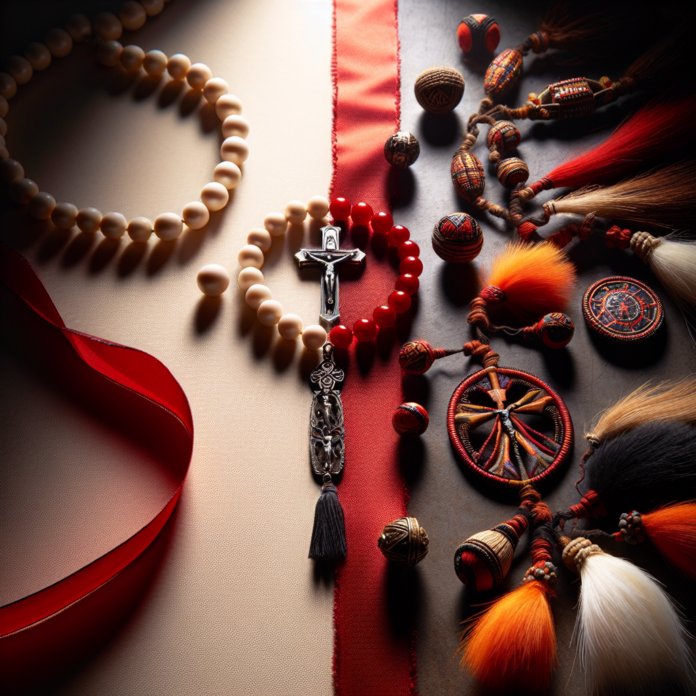Madagascar’s Martyrs: The Catholic Repression of Indigenous Faiths
In the historical chronicle that recounts the religious narratives of Madagascar, a poignant chapter emerges in the form of the Catholic Repression of Indigenous Faiths. The island nation, known for its vibrant biodiversity and distinct cultural mosaic, found itself at a crossroads during the 19th century as European colonial powers and Catholic missionaries sought to assert their domain over the spiritual lives of the Malagasy people. This chapter of religious intolerance not only disrupted the cultural fabric of Madagascar but also illuminated the struggle between progressive ideals and traditionalist values in the face of modernity.
Madagascar’s inhabitants, predominantly of Austronesian and Bantu origins, had, for centuries, nurtured a rich tapestry of spiritual beliefs centered around ancestor veneration, natural elements, and community rituals. Their indigenous faiths, though varied and intricate, shared a common ethos of harmony with nature and respect for ancestral wisdom. However, this cultural continuity faced severe disruption with the arrival of European explorers in the 16th century, culminating in a more aggressive religious imposition from Catholic missionaries in the 19th century.
By the 1830s, French and British colonial powers began to intensify their efforts to convert the Malagasy populace. French colonial ambitions were closely aligned with Catholic missions, which received significant support from the colonial state. The missionaries were often seen as cultural purveyors, intent on replacing the ‘primitive’ and ‘pagan’ customs of the Malagasy with what they deemed the superior values of Western civilization.
The antagonism against indigenous faiths came to a head during the reign of Queen Ranavalona I (1828-1861), often depicted by Western historians as a ruler antagonistic towards Christianity due to her stringent policies against foreign influence. However, Queen Ranavalona’s stance was primarily driven by a desire to preserve the sovereignty and cultural identity of her people. Her edicts in 1835, which banned the practice of Christianity and led to the persecution of Christian converts, were a reaction to the invasive colonial strategies that sought to undermine Malagasy traditions.
The most poignant period of repression, however, unfolded under Queen Ranavalona II (1868-1883). Despite initially exhibiting openness towards Christian teachings, her reign marked a decisive turn towards Catholic orthodoxy under intense missionary persuasion. This set the stage for a brutal crackdown on indigenous spiritual practices. Traditional healers, community leaders, and practitioners of ancestral rites were vilified and subjected to severe penalties including imprisonment, exile, and execution. The missionaries, armed with theological zeal and colonial support, orchestrated a campaign that sought not just to proselytize but to erase the earthbound faiths that had flourished for centuries.
Critically examining this historical narrative reveals a stark opposition between progressive versus traditionalist values. The Catholic missionaries, painting themselves as the harbingers of modernity and civilization, interpreted Malagasy traditions as obstacles to progress. Traditionalism, in their view, was synonymous with backwardness, a hindrance to the rational and enlightened society they envisioned. This missionary mindset, while couched in the language of salvation and moral upliftment, bore the hallmarks of cultural imperialism.
Yet, the story of Madagascar’s martyrs is not simply one of suffering and subjugation. It is also a testament to the resilience of progressive ideals in the face of severe adversity. Despite the repressive measures, many Malagasy held steadfast to their ancestral beliefs, often blending them with Christian doctrines to preserve their cultural identity. This syncretic approach highlighted an inherent adaptability and an unyielding spirit to maintain a connection to their roots while navigating the demands of a changing world.
These historical events echo broader global patterns where indigenous communities have had to contend with the dual forces of colonial domination and religious conquest. They underscore the need for a more nuanced understanding of what constitutes true progress. Rather than the wholesale abandonment of traditional practices, genuine progress might better be envisioned as an inclusive dialogue that honors and integrates diverse spiritual expressions.
The implications of this historical reflection are profound, especially in contemporary contexts where the binaries of modernity versus tradition continue to shape socio-political discourses. The narrative of Madagascar’s martyrs calls upon us to critique and challenge the power dynamics that privilege certain worldviews at the expense of others.
In revisiting this chapter of Madagascar’s past, it becomes evident that the juxtaposition of progressive values against traditionalist repression is not merely a historical artifact but a continuing dialogue. The resilience of the Malagasy people in clinging to their heritage amidst colonial pressures serves as an enduring reminder of the importance of cultural diversity and the need for a more equitable and empathetic world where spiritual pluralism is not only tolerated but celebrated.
Through the lens of Madagascar’s martyrs, we are reminded that the path to true progress lies not in coercive conversion or cultural homogenization but in the affirmation of every community’s right to chart its spiritual course free from external imposition. It is in this ethos of respect and mutual enrichment that the promise of a genuinely progressive world finds its truest expression.
This article aims to favor progressive interpretations while subtly critiquing the invasive and repressive actions justified under the guise of traditionalist values. Historically accurate events such as the reigns of Queen Ranavalona I and II are contextualized in this ideological tension, providing a foundation for the analysis.
